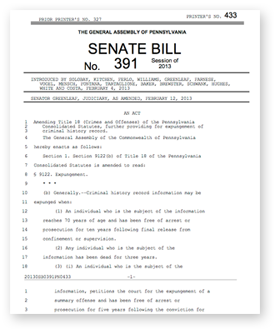Pennsylvanians seeking relief from the substantial burdens of a criminal record may soon be eligible to petition the court for an order of “limited access”. An order of limited access (i.e. record sealing) provides those with certain misdemeanor convictions the ability to obtain employment and housing without facing the discrimination that can accompany a criminal record.
How Will My Options Change Under the New Law?
The new record sealing statute will extend the opportunity to move past the stigma of having a criminal record to those who have been law-abiding citizens for at least 10 years. The eligible offenses will be nonviolent misdemeanors–second and third degree misdemeanors (notated as M2 and M3) and ungraded offenses. These options were formerly available only to a very small population of ex-offenders (individuals convicted of summary offenses, those 70 years or older and those who have been deceased for 3 years).
When Does the Law Go Into Effect?
The new law will take effect November 14, 2016, making it possible to effectively seal your record from being viewed by an employer or landlord in the event they obtain a background check. Petitions for orders of limited access, or record sealing, under Pennsylvania law 18 Pa. C.S. § 9122.1 may then be submitted to the courts for their consideration.
Am I Eligible For Record Sealing?
Eligibility requirements are as follows:
- No convictions for 10 years (beginning from your conviction date or date of completion of supervision, including probation—whichever is later)
- Only M2 or M3 (second or third degree) misdemeanors or ungraded offenses that carry no more than 2 years as a maximum sentence
- No more than 3 eligible misdemeanor convictions
- No felony or first degree misdemeanor convictions
- No convictions of any of the following offenses: sexual intercourse with an animal (3129), impersonating a public servant (4912), intimidation of or retaliation against a witness (4952, 4953), obstruction of a child abuse case (4958), any sex offense conviction that requires registration under Meghan’s Law (42 Pa.C.S. Ch. 97), or simple assault (M2 assault or second degree misdemeanor assault)
What is the Process?
In November 2016, the courts will likely receive a large increase in the number of individuals filing these petitions. Therefore, delays in processing by the court and District Attorney’s office are to be expected. If eligible, we recommend having your petition prepared and ready to file as soon as possible.
The petition must be filed in the Court of Common Pleas of the county in which the conviction occurred. Case documents are often required to ensure the accuracy of the information contained in the petition. A copy of your Pennsylvania Police criminal history report must also be included when filing. There is a filing fee of at least $132, but it may be more depending on the county or court. Sometimes there are fee waivers for those with limited resources.
The District Attorney’s office is then given 30 days to object to or approve the petition. If approved, the order will be granted and your record sealed. If the District Attorney’s Office objects, the court will set a hearing date before a judge at which the case will be argued. The District Attorney will present their objections and you or your attorney will have the chance to respond. It is often possible for your attorney to attend the hearing in your place, which can be helpful if you do not live near where you were convicted.
If your case is granted, law enforcement agencies will only be able to share information from your record amongst themselves, with courts (in the event of another arrest, it can be used for sentencing and bail determination) and with some governmental agencies (for licensing purposes, described in section 9121(b.1) and 9124(a). They will be prohibited from sharing any of the information with the public, including through a background or credit check.
It is important to note that approval of these petitions is not guaranteed. The court is not legally required to approve and may consider them on a case-by-case basis. Seeking help from legal professionals will likely increase your chances of obtaining a sealed record.




